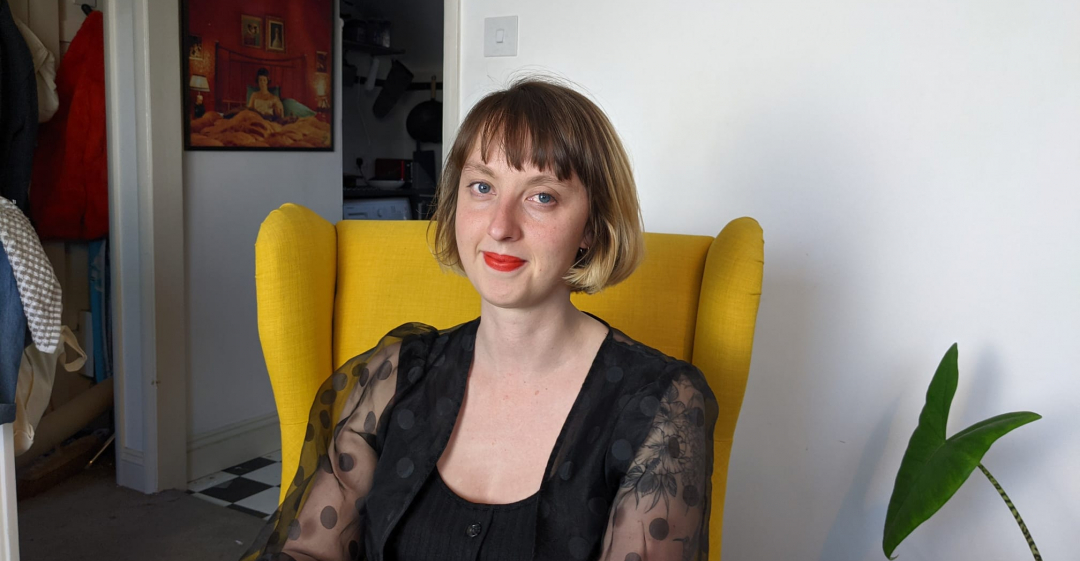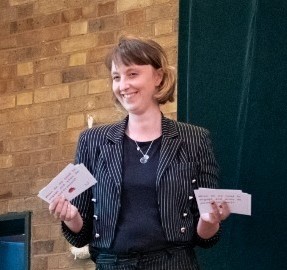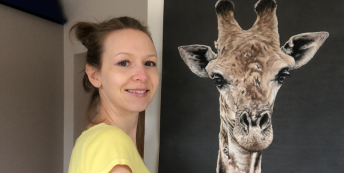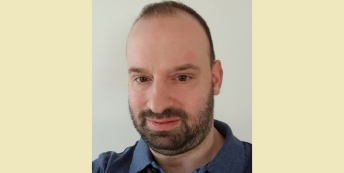“I didn't want to do another year that was exactly the same.”

What work were you doing previously?
Most recently I was working as a primary school music teacher.
I was a freelancer, but had quite a few longer term contracts with a few schools and with a music service, so quite a different model of work to most teachers.
Originally I’d built my paid working life around supporting my work as a pianist.
What are you doing now?
I’m a freelance facilitator.
I run workshops for a range of different organisations, including The Institute of Imagination, and a charity called First Give in schools.
I'm also doing some consultancy work with a firm called Grey which is more about learning design, and designing bespoke learning interventions for large global teams.
How did you feel in your work before you decided to make the change?
I was lucky in my old job in that I didn't hate it, I actually did love it.
And I could do it standing on my head. I was as good at it, but I wasn't learning anything.
I also felt a bit disconnected from the rest of the world. With some friends of mine who were looking to shift careers, I'd gone along to workshops in UX design and realised that the world of work had moved on quite significantly since I’d trained to be a teacher.
Why did you change?
My main motivation was really feeling like I didn't want to do another year that was exactly the same.
There were no further opportunities for me to progress, unless I took on more of a leadership role which I knew I really didn't want to do.
How did you choose your new career?
During the pandemic lockdown I was really lucky to maintain steady teaching work, but also have time to invest in learning new things.
As part of that I joined the Career Change Launch Pad, which helped me draw out potential career ideas, including something around working with people.
This was something I was already doing. I'd started to run training for my team on how to teach remotely during lockdown. I’d also in the past been involved in the running of workshops and events for swing dancing, something I love.
As part of the Launch Pad I ran a workshop for free as a test with the Launch Pad members on how to be a freelancer. The feedback I got from the group was great, and it just hit home that leading workshops and facilitating could be right for me as a career.
I'd tried some other things out too, which I was able to eliminate as they didn’t resonate – some graphic design bits, I did one day of a coding course and thought nope, not this.
I started to explore the facilitation space more fully, identified training I wanted to do, and spoke to people really broadly in the field. It just snowballed to the point where I was in networks with people who did facilitation work.
In one group someone said ‘I can't run this away day, can you did it for me?' and I found myself in a room, running an away day for a charity. I came away from it buzzing and wanting to feel like that at the end of my working week.
Are you happy with the change?
Yes.
Having a variety of clients was one of my big goals in building my freelance portfolio. What I find exciting now is that when I get up in the morning I'm not a hundred percent sure of what I'll be doing, I can't do it standing on my head.
I can also now see my partner on a weeknight, which I couldn’t do in my teaching career. I've got more flexibility and more opportunity for where my career can go. It's a really nice position to be in, it feels liberating.
What do you miss and what don't you miss?
I do miss having a team, mostly because I loved the last team of teachers that I worked with.
But I'm still connected to them and can still see them.
I missed having a workplace to go to, but I've joined a network for young leaders and as a part of that we have access to a workspace. I also now have access to a workspace through one of the clients I’m working with.
I'm in two really fantastic virtual networks of freelancers that are really active and supportive, who share jobs all the time. We have a facilitators group within one of them and we meet to share skills. So this functions much like a workplace.
Without that group I wouldn't have made it this far, I needed that solid support of a community behind me.
How did you go about making the shift?
I wanted to build my career shift slowly, as I couldn't afford to just step out.
So I spent the last year of my teaching career working my teaching jobs, while also getting facilitating experience, and doing my facilitator training, and running away days for a charity, and working for the Institute of Imagination, and doing a facilitator research project.
I did really well, and it was only after I'd done all that that I was able to prove to myself that I could do it, that I was ready.
I knew that if I didn't leave my old job at that point, I'd just be holding myself back. I also needed to go all in in terms of building my network and building the skills I'd need for facilitation work.
When it got to the end of that school year I knew I couldn't continue working my main job while building up my new career at the same time any more.
How did you develop (or transfer) the skills you needed for your new role?
I’d say my facilitations skills didn't come from my teaching career, but more so from my unpaid community-building work in the dance world.
Through running events and classes that had this element of co-creation behind them I've always had this philosophy of bringing people together to learn from each other.
In terms of training, I invested in some training but I did that after having spent a good amount of time already actively exploring facilitation, so only when I was really sure that it was what I wanted to do.
I decided to take part in the training knowing it would give me access to a community of people who'd also done it. While the course was a really interesting training, the most useful thing for me has been maintaining connections with other people who took the course.
But most of my training has been either free, or through shadowing other people and getting mentoring.
How did you handle your finances to make your shift possible?
Initially I did both careers (my old teaching career and building up my portfolio in the facilitation space) at the same time for a year.
So I knew I had my fixed income (from teaching) and then everything else that came from facilitation work I saved.
I calculated how long I thought I would need to get to a point where I was back on my feet again earning money. I knew I needed a certain amount of money in the bank not just for my bills but to live.
I knew that if I shut myself down to save money and didn't do anything or not have much of a life to save money that it would just lead to a mental health crisis.
I gave myself three months and told myself that my full time job for those three months was for building my business.
What was the most difficult thing about changing?
Pragmatically speaking, finances.
I had to be realistic, and plan quite far ahead. I was quite nervous about letting go of a regular income.
Also, it was difficult leaving an organisation that I really did like. They'd really been supportive of me in so many ways since I started, and the team were wonderful people who I felt close to, so knowing that I was going to lose that was hard.
I think I underestimated just how much more difficult it is to learn new things when you're over thirty, and I'd definitely stagnated in my old work life.
There was an identity shift to deal with, and knowing that I don't work in music anymore. It had very much been my whole life and something I'd always been working towards.
But I know now that I've found a career that suits me, and when I’m with other facilitators I feel like I'm with 'my people'.
What help did you get? 
I’ve had an unbelievable amount of help and I'm so grateful for it.
One of the first people I spoke to when I was looking into facilitation was someone who was setting up independently, who came from a corporate facilitation background. The first thing he said to me was ' you need a mentor'.
Coincidentally the same day my friend called me to ask how much I charge for piano lessons, as he wanted to have some. I realised his job was a facilitator, so I asked him if he'd be my mentor and in return I'd teach him piano. We've kept up that relationship for years.
Someone I met through my freelance network has been infinitely supportive to me, who is really far ahead in her facilitation career.
And I've made a conscious effort to network . Everyone in the learning and development space has been helpful since the get go. They’ve always been happy to offer advice, and no knowledge is guarded.
What would you advise others to do in the same situation?
Try things out, go to events, talk to a lot of people to ask them what they do.
I had no idea what was going on outside of my work life at the time. I didn't know that Learning & Development departments existed at the beginning of my career shift and I’m now working with them.
Don’t apply for jobs. I’ve not applied for anything that I’ve ended up doing. Talking to people (in person if you can) is more useful.
You might have a skill that you're using already or have used in the past that you have no idea is profitable.
If you are really miserable in your work, do what you can to leave. Someone said to me 'sometimes you have to close a door for another door to open, you can't just wait for the door to close itself'. So close the door if a job is making you miserable, it's not worth it to stay.
To find out more about Ellie's work, visit www.jesterlearning.co.
What lessons could you take from Ellie's story to use in your own career change? Let us know in the comments below.
Ellie took part in our Career Change Launch Pad. If you're ready to join a group of bright, motivated career changers on a structured programme to help you find more fulfilling work, you can find out more here.



